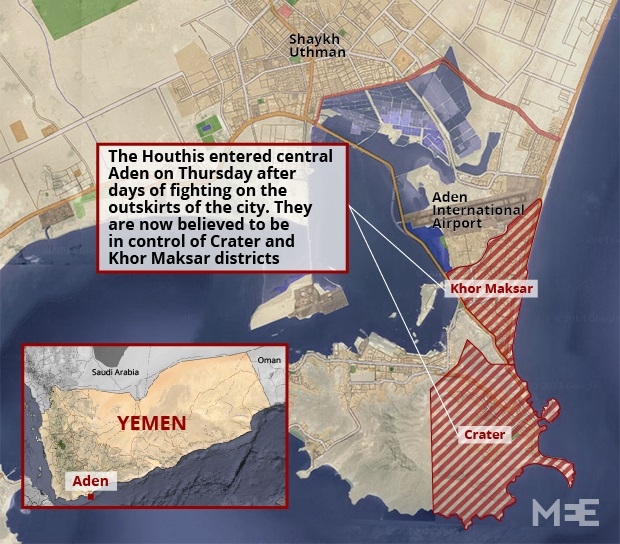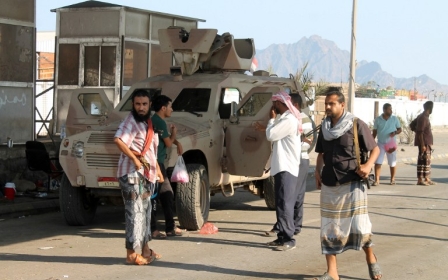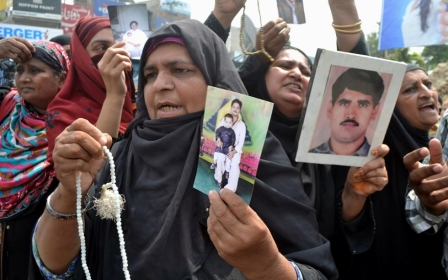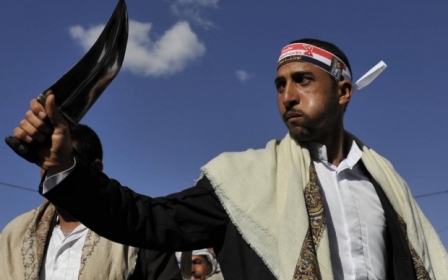Yemen rebels seize presidential palace in Aden
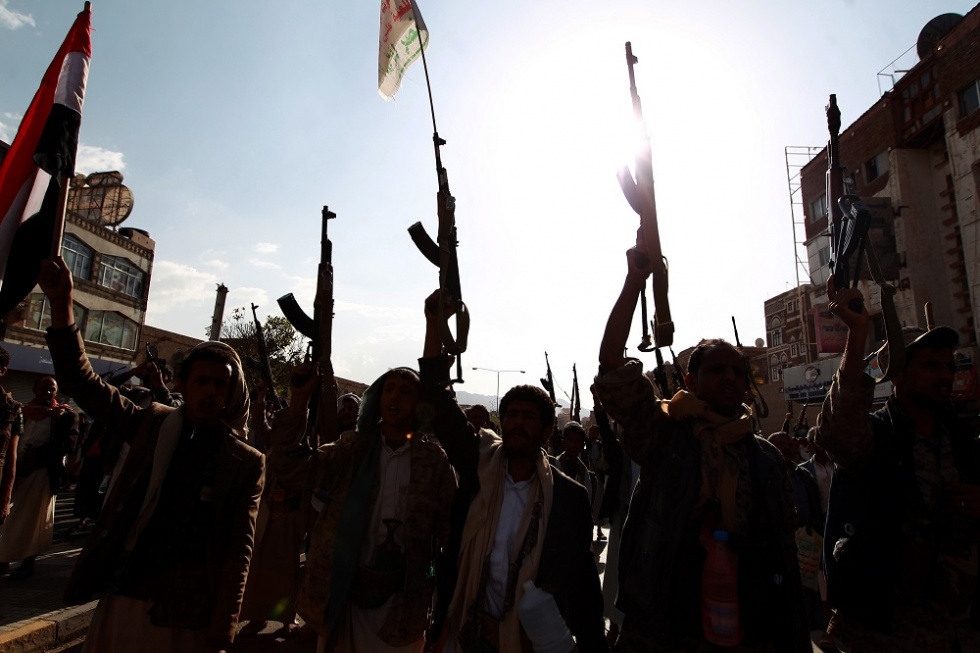
Yemeni rebels seized President Abedrabbo Mansour Hadi's palace in his former southern stronghold Aden Thursday, dealing a symbolic blow to the self-exiled leader despite a week of Saudi-led air strikes.
As the war-torn country descended deeper into chaos, Al-Qaeda militants freed hundreds of inmates in a jailbreak.
The advance by Houthis deep into Aden, the last bastion of Hadi supporters, appeared to further douse prospects of his returning any time soon from neighbouring Saudi Arabia.
"Dozens of Huthi militia and their allies arrived in armoured troop carriers and entered Al-Maashiq presidential palace," said a senior security official who witnessed their advance.
Heavy clashes erupted afterwards between the rebels and their opponents inside the compound, a cluster of buildings perched on a hilltop accessible by a single winding road.
A defence ministry official in Aden later confirmed the fall of the palace, saying it was now controlled by forces loyal to former president Ali Abdullah Saleh, which have allied with the Huthis.
The rebels have seized swathes of the country including the capital Sanaa.
At least 44 people -- including 18 civilians -- were reported dead on Thursday in fierce fighting between opponents and supporters of Hadi in the southern port city.
"There are bodies and wounded in the streets and nobody dares to approach," said Khaled al-Shaie, a resident in the central neighbourhood of Crater.
Hadi fled to Aden from the capital after the Huthi Shiite rebels seized power in February, and the palace came under fire from warplanes twice during his stay.
He went into hiding last week as the rebels bore down on what was his last stronghold, later surfacing in the Saudi capital as Riyadh launched an air war on the rebels.
The Saudis claim to have mobilised 150,000 troops, Saudi-owned al-Arabiya reported last week, with Riyadh not ruling out a ground invasion if necessary.
Residents of Aden's central Crater district told Reuters that Houthi fighters and their allies were in control of the neighbourhood by midday. They said that the Houthis had entered the city with tanks and with their militias patrolling the streets.
"People are afraid and terrified by the bombardment," one resident, Farouq Abdu, told Reuters by telephone from Crater. "No one is on the streets - it's like a curfew."
A spokeswoman for the aid agency Medecins Sans Frontieres (MSF) told the BBC that its hospital in Aden had received more than 500 injured people from all sides in the conflict over the last two weeks.
Translation: One of Aden’s largest markets on fire
Translation: Houthi and Saleh’s militia carrying out grave crimes ag humanity in Aden, they won’t escape justice
While the Saudi-led coalition has thus far failed to roll back the Houthis in Aden, they do appear to have made some progress further north in Ad Dali, some 60 kilometres from Aden.
A security official told Anadolu Agency on Wednesday that an army brigade loyal to the Houthis had disintegrated due to the raids with a senior commander, Abdullah Dabaan, fleeing the city.
The Houthi rebels are allied with army units loyal to former President Ali Abdullah Saleh and are accused by Saudi of being backed by Iran.
They first seized control of the capital Sanaa last September but have since tried to extend their influence across the country and in January stormed the presidential compound placing Hadi and many of his ministers under house arrest.
Hadi managed to flee to Aden in February, but while the international community has largely flocked to his side, the Houthis have continued to make large gains and now control almost all of western Yemen. Hadi fled to Saudi Arabia late last month as the militias began to hone in on the city.
Hadi took power after Saleh penned a deal to step down following months of deadly protests against his rule that broke out in 2011 in the wake of the so-called Arab Spring. He is seen as Western-backed and has been a key ally in the US war on al-Qaeda which has been carrying out a long-running insurgency in the country.
As the Houthis squared off with pro-Hadi forces in the south, al-Qaeda was able to stormed a prison in southeastern Yemen on Thursday, freeing several hundred inmates including one of their leaders, a security official said.
Khalid Batarfi, a senior al-Qaeda figure who had been held for more than four years, was among more than 300 prisoners who escaped from the jail in Hadramawt province, the official told AFP.
Two prison guards and five inmates were killed in clashes, the official said.
Batarfi is among al-Qaeda in the Arabian Peninsula's (AQAP) top regional commanders, known for his leading role in a 2011-2012 battle with Yemeni government troops during which militants seized swathes of territory in the south and east.
Al-Qaeda militants also clashed on Thursday with troops guarding the local administration complex in the provincial capital Mukalla, a branch of the central bank and the police headquarters, the official said.
Observers have warned that Yemen-based AQAP, classified by the US as the network's deadliest franchise, could exploit the unrest to strengthen its presence in the country.
Casualties rise
Since the conflict has escalated, the casualty list has continued to climb. More than a hundred civilians have been killed in the last week alone. This includes at least 62 children who have been killed and 30 injured in Yemen over the past week, UNICEF said on Tuesday.
An unknown number of combatants have also been killed.
The Saudi-led coalition has been blamed for not taking sufficient care to avoid civilian deaths.
In one particularly incident at least 25 people were killed overnight on Tuesday when a blast rocked a dairy factory in Yemen's Red Sea port of Hudayda, medical sources told Reuters.
The true death toll could be even higher, with the provincial governor telling AFP that 37 had been killed. Other sources said that the death toll was 35.
The incident appears to be one of the deadliest in terms of civilian casualties since the Saudi-led coalition began its aerial bombardment campaign in Yemen last Wednesday. It was not immediately clear if the factory was bombed from the air by the coalition or hit by Houthis or other forces.
A refugee camp was also hit by Saudi-led military jets, killing up to 40 internally displaced people from a previous conflict between the Houthi and government forces.
The Houthis have also reportedly been firing at protesters and using snipers in the towns and cities they enter.
"The Secretary-General reminds all parties involved in military operations in Yemen of their obligations under international humanitarian law to ensure the protection of civilians," UN Secretary-General Ban Ki-moon’s office said in a statement issued earlier this week.
At least 44 people were killed on Thursday in fighting between the Houthi militia and supporters of President Hadi in Aden, medics and a military official said.
Eighteen civilians and six members of a local militia resisting the rebels' advance were killed in the fighting, a medic said.
A military official said 20 Houthi militiamen also died in the clashes.
New MEE newsletter: Jerusalem Dispatch
Sign up to get the latest insights and analysis on Israel-Palestine, alongside Turkey Unpacked and other MEE newsletters
Middle East Eye delivers independent and unrivalled coverage and analysis of the Middle East, North Africa and beyond. To learn more about republishing this content and the associated fees, please fill out this form. More about MEE can be found here.


